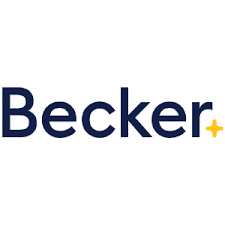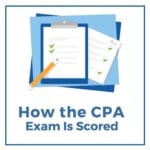Passing the CPA exam is a big accomplishment. However, it’s not the last step in getting your license as a Certified Public Accountant.
The AIPCA and state regulators are concerned about ethics. Furthermore, most states require CPA candidates to take an ethics exam in order to obtain a CPA license. This discussion analyzes the ethics exam requirements for several states to help you understand the process.
Use the information contained here to understand the format of the ethics exam, the steps required to take your test, and how to study for and pass the exam!
See the Top CPA Review Courses
- 1. Becker CPA Review Course ◄◄ Endorsed by Big 4 Accounting Firms + Save $1,140
- 2. Surgent CPA Prep Course ◄◄ Best Adaptive Technology
- 3. Gleim CPA Study Materials ◄◄ Largest CPA Test Bank
AICPA Ethics Exam Format
As stated here, “The AICPA ethics exam is required by most state boards after passing the CPA exam in order to become certified and obtain a CPA license. The CPA ethics exam is a take-home test that comes with a textbook and is taken online.”
Basically, the AICPA ethics exam is a multiple-choice question test. It covers both national (AICPA) and state rules regarding professional conduct. Furthermore, candidates are instructed to purchase and read a CPA review book specifically for this section in order to adequately prepare for it.
Typically, you don’t have to take the ethics exam immediately after passing the CPA exam. Additionally, most states only require you to pass the ethics exam within a year of two of passing the CPA exam. In some states, passing the ethics exam will even count toward your annual CPE requirement.
Ethics Requirements by State
To find out your state’s ethics exam requirements, you may need to check the state board of accountancy website, the state CPA society, or both. Here is some information concerning larger states for CPAs and how they address their ethics exam requirements:
 California CPA ethics exam
California CPA ethics exam
Here is the California CPA society page for the ethics exam. In their own words, the explanation of their test is as follows:
“Our exam materials provide comprehensive coverage of the AICPA Code of Professional Conduct and California Accountancy Act and Accounting Rules and Regulations. You will find clear, detailed explanations of the rules that will assist you in answering tough ethical questions. Please allow about 16 hours to read the 300-page study book and complete the test.”
Ultimately, the online exam’s cost is $175 for both state society members and non-members.
The California ethics exam consists of 50 multiple choice questions without a time limit. Candidates “have six attempts to pass the exam with a grade of 90 percent or better, or no more than five missed questions.” The exam must be completed within one year of purchase, and your test results are valid for two years. Consequently, this gives you time to complete other licensing requirements.
Illinois CPA ethics exam
The Illinois state society explains that: “Illinois candidates are required to pass a separate examination on the rules of professional conduct before they are issued an Illinois CPA Certificate. This on-demand self-study course can be taken at your convenience, even before you are approved to sit for the CPA exam.” The on-demand, self-study course costs $169 (or $99 for state society members).
 Virginia CPA ethics exam
Virginia CPA ethics exam
The Virginia Board of Accountancy (VBOA) requires that CPA candidates: “Complete the AICPA self-study Professional Ethics: AICPA’s Comprehensive Course (For Licensure) with a score of 90% or better. The applicant may mail, fax or email a copy of the course certificate, with the score, to the VBOA.”
Virginia also requires all CPAs to complete the annual Virginia-Specific Ethics Course.
Texas CPA ethics exam
Texas requires CPA candidates to complete “the examination on the board Rules of Professional Conduct” before a license can be issued.
Furthermore, the state also has a 4-hour CPE ethics requirement for every licensed CPA in the state. Additionally, Texas offers a free online course to address the requirement, making it among the easier regions for completing this required accountancy examination.
Learn More About The CPA Exam
- How To Become A CPA
- CPA Exam Stats and Facts
- Best Order To Take CPA Exam
- Motivational Songs For Studying
Wisconsin CPA ethics exam
To obtain a CPA license in Wisconsin, candidates must: “Pass the ethics exam after passing all four sections of the CPA Exam.” The ethics exam covers the AICPA and the state rules regarding conduct. Therefore, candidates in this state should focus on both during their study sessions!
Missouri CPA ethics exam
In Missouri, the CPA ethics exam is “an open-book, multiple choice exam.” Furthermore, as a CPA candidate you can: “order, take, and submit answers for the ethics exam at any time during the licensure process.”
Candidates can also choose between a hard copy or online version of the exam. Essentially, with so much flexibility in terms of formatting and study materials, Missouri is among the most candidate-friendly regions for ethics exam completion.
 Ohio CPA ethics exam
Ohio CPA ethics exam
Finally, Ohio requires that CPA candidates complete a “Board approved course in professional standards and responsibilities (PSR), completed within the last year.” The approved course providers are listed here.
Furthermore, CPAs in Ohio must also meet an annual CPE requirement for PSR.
As you can see from the information above, every state has a slightly different process for handling the ethics exam. Therefore, you should check with your state’s board of accountancy and CPA society to verify the requirements.
Requirements aside, what about the ethics exam itself? Keep reading to learn more:
Get Discounts On CPA Review Courses!

Take $1,200 Off Surgent CPA Ultimate Pass

Take $1,110 Off Surgent CPA Ultimate Pass
CPA Ethics Exam Tips
While this is not a long test, you need to invest the amount of study time suggested by your state board in order to pass the ethics exam. But of course, study time alone isn’t going to guarantee a passing grade; take a look at the tips below to hedge your bets!
AICPA Code of Professional Conduct
As mentioned above, the ethics exam covers topics from the AICPA Code of Professional Conduct. Hence, many of these same topics are addressed on the CPA exam.
If you review the AICPA code, you’ll note these important topics in the table of contents:
- Integrity and objectivity
- Independence
- General standards, compliance with standards
- Accounting principles
Most state codes of conduct use these same categories. Although some states may put less emphasis on these principles and points than others, it’s still wise to look into these topics before exam day.
[uam_ad id=”7978″]
State codes of professional conduct
Alternatively, your state’s code may have unique requirements that differ from the AIPCA code. This is why studying your state’s material is important.
Check out the Texas code of professional conduct. As an example, this section of the state’s code addresses contingency fees. Note this quote: “A person shall not perform an engagement as a testifying accounting expert for a contingency fee.”
This issue also applies to the AIPCA code, but the topic is rarely tested on the CPA test. Therefore, studying and passing the CPA exam may not be sufficient to pass the ethics exam.
CPA Ethics Exam Questions
While there are certainly differences, much of the detail in the AICPA code is similar to your state’s code. You will see questions that are similar to the CPA exam, but not identical. Here are some common examples:
- Independence: When must a CPA be independent to perform audits, tax work, and other engagements?
- Client records: Under which circumstances must a CPA disclose client information to a third party, such as a court?
- Accountants using judgment: How must a CPA apply accounting standards, and what must a CPA do if a client (or the CPA’s employer) wants to change a particular accounting method?
Rely on your state’s study guide, which contains all of the state-specific rules that you must know for the ethics test. Don’t refer to your CPA study materials, because that approach may cause confusion.
Take the Extra Step
Your state society’s ethics exam is usually that last step you must take before securing your CPA license. While studying for this exam may seem unnecessary, make the effort to study for the ethics exam, and get it behind you. That’s the only way to properly beat the CPA exam and begin your career as a public accountant!
Refer to your state society’s website, purchase the right materials, and study for the exam. Use these tips to pass your ethics exam and start your career as a CPA; you won’t regret it.

 California CPA ethics exam
California CPA ethics exam
 Virginia CPA ethics exam
Virginia CPA ethics exam


 Ohio CPA ethics exam
Ohio CPA ethics exam







